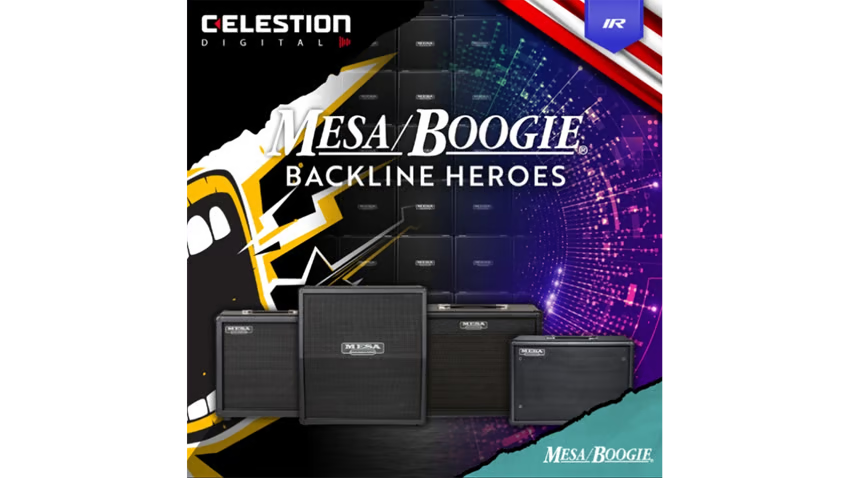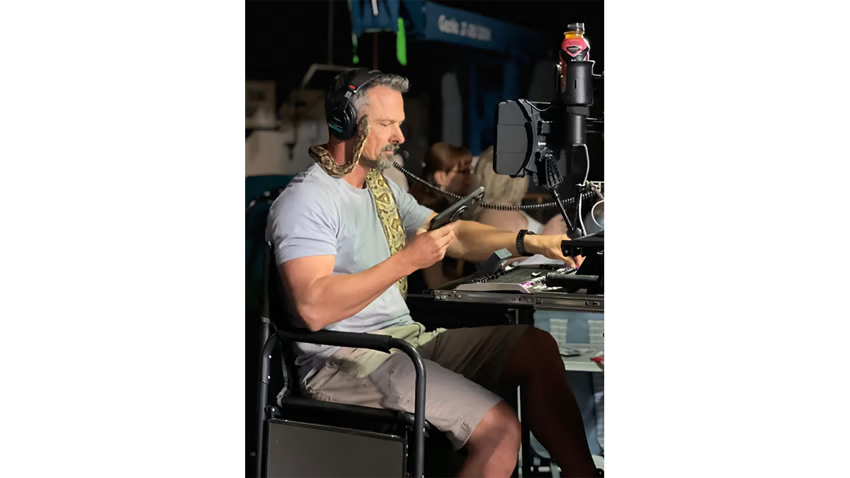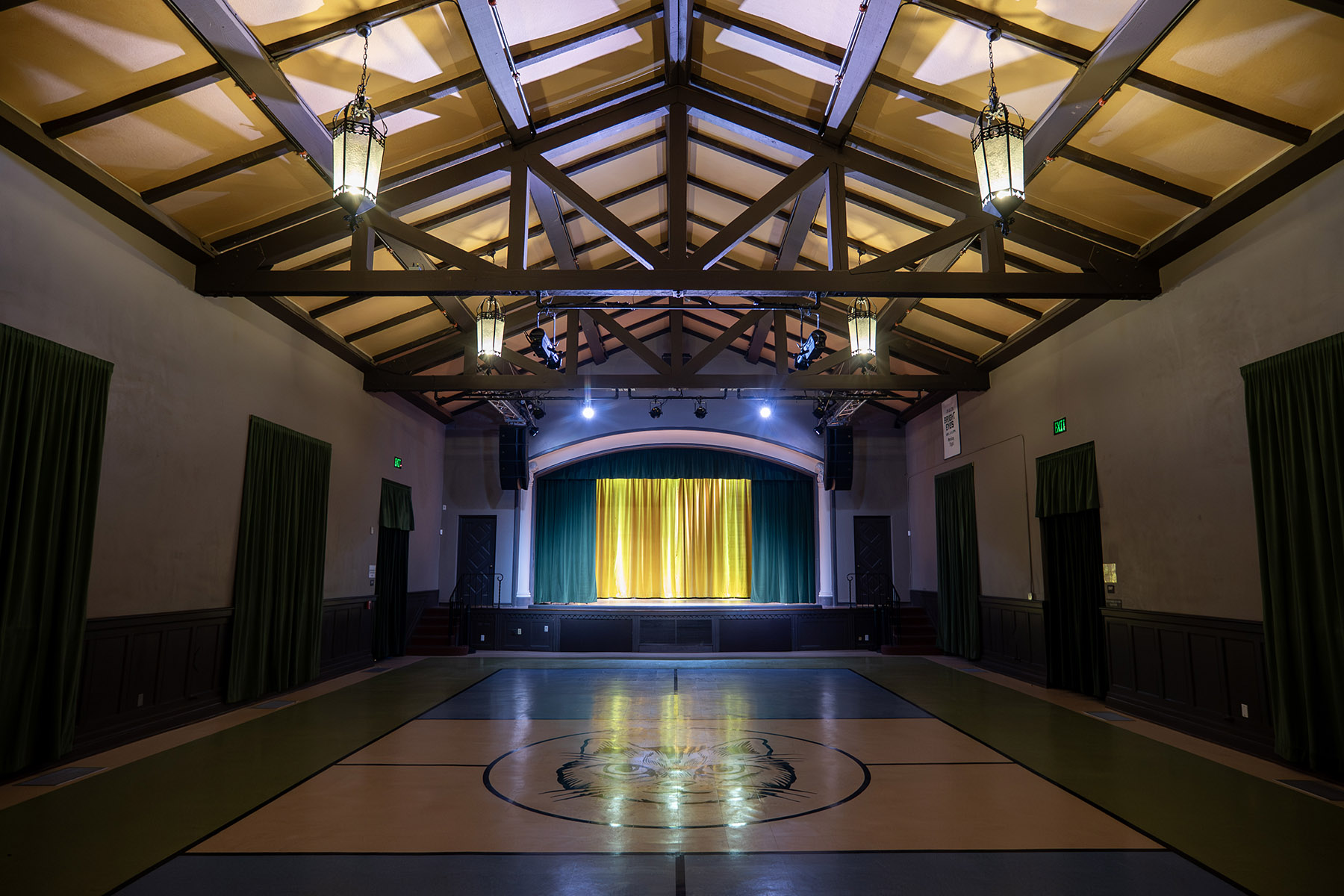Alyse Porsella is an Automation Technician with Cirque du Soleil at Sea on board the MSC Bellissima. But before she called the sea her newest home, her time with Elite Training and life on the road brought an arsenal of skills to her already robust repertoire. Alyse sat down with us to discuss tour life, the friends who've acted as mentors, and her one true love — automation.
How did you get your start in the industry?
I started out in public schools in Long Island, New York. You had to take one tech class when you were younger, but I always just wanted to do acting. I took one tech class and fell in love with it immediately. Everyone kept telling me it's weird to combine the two, but I realized I was a terrible actor, so I combined it. Ever since middle school I had been doing backstage work and acting, but then I just switched over and made it purely technical. I took every tech class you could imagine in high school, like woodshop and so many others.
For college, I realized I wanted to work in backstage theatre, technical carpentry, and wanted to attend a Catholic school, which is how I accidentally found DePaul University where I studied for four years.
It was all professionals teaching, which is why I wanted to go there. I wanted to have a professional to work under. They also had a study abroad program that took me to London!
Who are some of your most prominent mentors?
Shane Kelly would be one. He was my advisor in college and he pushed me in all the right directions. Everyone at the internships I did was great and helped me along the way. I didn't have a lot of older mentors in my time in college but I had five classmates that helped me through those years and still do now. They helped me challenge myself and kept me going. They are still my go-to's when I need help or have questions.
What is some of the best advice you've ever received?
Because everyone knows I want to travel, a lot of the advice I've received is to do it while you're young — otherwise, you're going to regret it.
Something that has definitely stuck with me career-wise is, "Don't stress because at the end of the day, all we are really doing is building fake houses for fake people."
Would you say the internships that you've done have allowed you to travel?
Yes! I would like to travel more outside of the U.S., which is where the study abroad came in. But I have gotten all over the U.S. because of my internships. The internships have helped me get jobs, and I toured with a show and that had me traveling all over the U.S. and Canada. My first ship took me to Alaska and the cruise ship I am on now has taken me to the Mediterranean and the Middle east.
Tell me about your experience with the Elite Intensive training program that you completed through USITT.
I was 100 percent a guinea pig and I had fun with it. Working with Princess Cruises was great. It was two different ships and both ships had their own set of rules. The person in charge of me said to the crew, "She's up for whatever you guys feel comfortable with her doing whether you want her to run the shows or just manage." The first ship, The Coral, was on board with me managing but didn't want me to operate anything.
The second, larger ship, The Star's crew said, "No, you're going to learn the shows. You're going to learn everything!" They wanted me to be a manager but run the shows as if I was officially in the position. They said, "We want to train you so that if you want to come back and do the position, you can." That's a large part of why I still want to work on ships. I really got enjoyment from that.
How did you adjust from training on the ships to training on land with Cirque du Soleil?
I went on to KÀ from the ships and I stayed there for the majority of the intensive. Here and there I would be taken away to go to other shows. I went to every Cirque show on the strip except for Zumanity. And I spent anywhere from three days to a week and a half at each show. The program allowed me to experience a large selection of operating systems because KÀ uses an older version. At one point we were working on programming on the new software for the show. They're in the process of trying to transfer over, but they're not there yet, so I got to take the cues that already exist and then put it onto the eChameleon board.
It was interesting going over to the other shows that have navigator, which I've only seen before. All the shows use different boards because it's all different types of flight. KÀ is mostly the decks, there are a lot of performer flights and they're scattered between the board. KÀ has five automations boards, whereas the other shows have one, two, or three. KÀ is the only one that has a board that is mostly a monitoring position.
It's a position that knows all the boards and is there to help you get out of trouble if something in the system goes wrong that you can't control while operating something else. I had never seen that before and it's the only show I've ever seen do that.
What have been your biggest takeaways from all of these experiences?
They definitely brought me out of my comfort zone on more than one occasion, and I find that to be a really good thing. Just doing something, going somewhere by yourself and just having to figure out what you're doing on a daily basis and what you're doing to help further everything you're working on was new for me.
I really make it a big thing to learn something every day. Since I was at KÀ for six months, I did basically the same thing over and over again. It can get a bit monotonous, so after a while, I would think of at least one question per day. I would try to make it something random. It may sound weird, but my biggest question that took a while for people to answer was, "How do you copy and paste on the board?" Since the system isn't like a normal computer, you can't just hit control, alt. It turned into a whole thing of like, "Oh, we knew how to do it but we haven't done it in awhile. Let me think about it and then get back to you." It was asking the questions you don’t normally get, but it was also helping both of us learn.
How do you find a work-life balance in these unique working conditions? Do you ever say no to opportunities if you're overwhelmed?
I try not to say no, but there is definitely a point where I have to. When I was chosen to participate in Elite Intensive training, I was still on tour with Jersey Boys and I had to quit my job to do that. That was one of the hardest decisions I ever made.
My work-life balance depends on where I am and what I'm doing. On the ship, it's very, very hard because you're living on the ship and with other people. I always do like going to the gym or something, just to get out and be by myself for a little bit. On tour, and partially while I was in Las Vegas, I would just go hiking or find new "weird" places. Whenever I travel, I make a list of things to go see. On tour, there were "weird" little things to go see. For example, I saw the world's largest filing cabinet. I've definitely gone and seen Peter Pan things because I really like Peter Pan. There's Peter Pan sculptures and statues everywhere. I enjoy looking up those "weird" things to take my mind off of work.
What did a typical day on tour look like for you?
On tour, I'd get up around 8 a.m. and head to the venue. I'd go into the venue, look around, make sure everything is where it needs to be, and then start unpacking trucks. You're pretty much unpacking trucks for half of the day, depending on your crew.
I generally wasn't in the truck but would be directing people where to put things when they came off the truck and then I would start with a crew to start assembling. The LED portals were our first thing along with your soft goods, and then you just keep working up until lunch. Right before lunch, we'd try to get what was called "the bridge" up.
At the beginning of the day, I would be in charge of about four people. By about 11 a.m. I'd be in charge of 10 to 12 people. By then we'd usually have our bridge together, either on the ground or up in the air, depending on how the day went. If it was a good day, it'd be up in the air and standing.
After that, it's all about the little things. On a good day, everything like the bridge and the staircase would be up a little bit before dinner. After dinner, we'd come back and start getting ready for the show itself. Around 5 p.m. we'd start doing presets for the show and also testing automation which was just two winches with knife and dogs in the front of the stage that held mics. That time was spent making sure the spikes are correct, running it a few times, and doing any altering that we needed to. From there, we'd run the show. Then came strike. We'd take everything down and pack it into trucks, whereby the end of the day I would be on the last truck and I'd be the one packing that truck with four people. It sounds like such a long day, and like such a crazy life.
Do you ever crave the normalcy of a 9 to 5 job or do you love your current lifestyle?
I love it. I am terrified of a desk job unless it's a programming desk job. Even then I think, "I don't know how I'm going to just sit here, I'll get stir crazy."
I am completely a night owl. Being on tour was good and bad for that. Sometimes we closed the doors of our truck around 3 a.m., which was fine with me, but waking up at 8 a.m. the next morning was the hard part.
What advice would you give to someone who's just starting out in the live entertainment industry?
I think all three facets, touring, cruise ships, and automation, come with their own advice.
On tour, you definitely need to be okay with not sleeping. There are times where you sit down for a week and you get free time all the time during the day, but you're really tested during those three one-nighters in a row.
On cruise ships, you definitely have to be okay with a confined space. You need to keep your cool because you're constantly surrounded by the same people, and they all feed off each other's energy. That happens with touring, too, but if you need to venture out, you can, whereas on the ship you're stuck with each other until you go into port.
As far as automation goes, never get too comfortable — that's when things go wrong. Always have a healthy amount of fear. You might be pushing buttons and running the same track all day long, but once something goes wrong, that's when your knowledge is needed and tested.
Because I'm doing automation at such a young age, that was a big topic during the Elite Intensive. Usually, people who do automation are those who have been in the field for a while and they've experienced many things in the industry. As technology changes, they are the first ones to experience it. It's now getting to the point where the younger generation is becoming more prevalent in these jobs.
It's a balancing act of seeing the older generation and wanting to learn from them, but also making sure that you make it your own, working with it, and proving that you can do it.
Tell me about the work you did at USITT19.
I arrived in Louisville early and was an assistant production manager on the Expo floor. I helped Chris Russo and the local crew set up all six of the stages there. We also set the two front entrance pieces that were outside the main doors. I also spent some time working at the Cirque du Soleil booth.
What value do you find in USITT?
I got into it accidentally during my freshman year of college. I was told, "Come on this trip, it'll be great." It was a trip to Purdue University to do workshops and lectures with people who work for Cirque du Soleil. I didn't realize it was through USITT until after the fact. I went to that and I thought it was such a great workshop. I actually met one of the people who spoke to me there while I was in Las Vegas during the Elite Intensive. It was a lot of meeting people and networking, which was great. After that, people were telling me, "Oh, you should try coming to the Conference," so I went almost every year after that. When I attended, I spoke to different exhibitors and I got my internships with Sapsis Rigging and ZFX Flying Effects. I realized, "Okay, last year I went and got this internship. How about I go again, just talk to people and network with people?" and that’s how I got my job with NETworks.
Almost every time I've gone I've come out of it with friendships, a job, or new connections. I also worked in the AV office for a bit as a student volunteer and made some great friends that I'm still friends with today. We try to network consistently because they moved to New York City, so we all work out there sometimes.
Where do you see yourself five years from now?
I've been back and forth on it. I hope that I'm doing automation. Seeing that I just started with Cirque du Soleil, I think automation would be a great way to stay with the company. At the same time, I always miss not running the show, the pre-production, and being a TD and a carpenter. But at the end of the day, I know that automation is my true love, so, I'd be happy with either.
How does it feel to have done so much at this point in your career?
It's so exciting. I completely forget that I've done so many great things. Christine Troscher introduced me to someone through email, and laid out everything that she knew about me and I was like, "Wait, I did all that?" Now I get why people come talk to me.
I've had a bunch of interviews lately where older men are interviewing me and they say, "I can't believe I'm talking to such a young girl. Not even the fact that you're a girl, but you're this young." I've had someone say, "You're such a strong woman. I wasn't expecting that. It's great to see it."
I always forget how many great things I've accomplished. I definitely have imposter syndrome sometimes.
Off
More News
Support USITT
For many 501(c)3 nonprofit organizations, USITT included, donations are a lifeline. We are able to continue to expand our online offerings to our Members and to our industry thanks to Membership dollars and the generosity of our donors.







